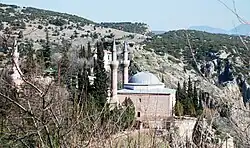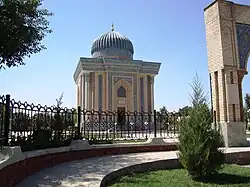Sheikh Edebali
Sheikh Edebali | |
|---|---|
| Personal life | |
| Born | |
| Died | 1326[2] |
| Parent |
|
| Known for | Sufism[1] |
| Relations | Ildiz Hatun (wife) Rabia Bala Hatun (daughter) |
| Religious life | |
| Religion | Islam |
| Denomination | Sunni |
| School | Hanafi |
| Creed | Maturidi |
| Muslim leader | |
| Period in office | 13th and 14th century |
Influenced by | |
İmâdüddin Mustafa bin İbrâhim bin İnaç el-Kırşehrî [1] (died in 1326), often known as Sheikh Edebali (Turkish: Şeyh Edebali), was a Turkish Muslim Sheikh of the Wafaiyya order (tariqa) and leader of the Ahi brotherhood,[4] who helped shape and develop the policies of the growing Ottoman State.[5][2] He was assigned as the first Qadi of the Ottoman Empire.[2] Edebali was the father of Rabia Bala Hatun, who married Osman Gazi, the founder of the Ottoman Empire.
Interaction with Ottoman leaders
Edebali often conversed with his close friend Ertuğrul Gazi, the father of Osman I about Islam and the state of affairs of Muslims in Anatolia. Osman had been a frequent guest of Edebali. Edebali became Osman's mentor and eventually gifted him a Gazi sword. Osman at Edebali's dergah, dreamed of a state.[6] This dream thus led to the establishment of a state. After this, Edebali's daughter Bala Hatun was married to Osman I. As a result of this marriage, all the Ahyan sheikhs came under the Ottoman control. This had a major impact on the establishment and development of the Ottoman Beylik.

In popular culture
Sheikh Edebali has been portrayed in the Turkish historical fiction series; Kuruluş "Osmancık" (1988) by Turkish actor Haluk Kurtoğlu,[7] and in the historical fiction series Kuruluş: Osman (2019 - present) by Turkish actor Seda Yıldız.[8]
See also
External links
References
- ^ a b Akgunduz, Ahmed; Ozturk, Said (March 2011). Ottoman History - Misperceptions and Truths by Ahmed Akgunduz & Said Ozturk. Istanbul. p. 45. ISBN 978-975-7268-28-4. Retrieved 28 January 2021.
{{cite book}}: CS1 maint: location missing publisher (link) - ^ a b c Şahin, Kamil (1994). "EDEBÂLI". TDV Encyclopedia of Islam, Vol. 10 (Dûmetülcendel – Elbi̇se) (in Turkish). Istanbul: Turkiye Diyanet Foundation, Centre for Islamic Studies. pp. 393–394. ISBN 978-975-389-437-1.
- ^ "Bilecik Şeyh Edebali Üniversitesi". bilecik.edu.tr. Retrieved 30 January 2021.
- ^ "Şeyh Edebali Kimdir?". İslam ve İhsan (in Turkish). Retrieved 2025-01-13.
- ^ The Ottoman Empire, by Halil Inalcik, p. 55.
- ^ The Origins of the Ottoman Empire, by Mehmet Fuat Köprülü, Gary Leiser, p. 6.
- ^ KUTAY, UĞUR (10 February 2020). "Osmancık'tan ve Osman'a". BirGün (in Turkish). Retrieved 12 June 2020.
- ^ "Şeyh Edebali kimdir, ne zaman öldü? İşte Şeyh Edebali'nin hayatına ilişkin bilgiler…" (in Turkish). Hurriyet. 18 December 2019. Retrieved 28 January 2021.
Muslim scholars of the Hanafi school | |||||
|---|---|---|---|---|---|
| 2nd/8th |
| ||||
| 3rd/9th |
| ||||
| 4th/10th |
| ||||
| 5th/11th |
| ||||
| 6th/12th |
| ||||
| 7th/13th |
| ||||
| 8th/14th |
| ||||
| 9th/15th |
| ||||
| 10th/16th |
| ||||
| 11th/17th |
| ||||
| 12th/18th |
| ||||
| 13th/19th |
| ||||
| 14th/20th |
| ||||
| 15th/21st | |||||
| Living |
| ||||
Scholars of other Sunni Islamic schools of jurisprudence
| |||||
| Maturidi scholars |
|  | ||||||||||||||||||||||||
|---|---|---|---|---|---|---|---|---|---|---|---|---|---|---|---|---|---|---|---|---|---|---|---|---|---|---|
| Theology books | ||||||||||||||||||||||||||
| See also | ||||||||||||||||||||||||||
Maturidi-related templates
| ||||||||||||||||||||||||||
| Authority control databases |
|---|
